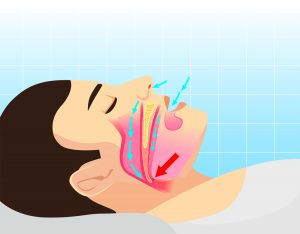 About 50 to 70 million people in the U.S. are chronic sleep apnea sufferers; more than 85 percent of them are undiagnosed.
About 50 to 70 million people in the U.S. are chronic sleep apnea sufferers; more than 85 percent of them are undiagnosed.
The Mayo Clinic defines sleep apnea as a potentially serious sleep disorder in which breathing repeatedly stops and starts. Sleep apnea sufferers may snore loudly and feel tired, even after a full night’s sleep.
There are two main types of sleep apnea: Obstructive Sleep Apnea (OSA) commonly occurs when an airway collapses when you sleep; Central Sleep Apnea (CSA) occurs when your brain doesn’t send the proper signals to the muscles that control breathing. A person with OSA may experience shallow breathing and possible pauses in breath. Breathing interruptions can last anywhere from a few seconds to over a minute and occur up to 30 times an hour. These disturbances can cause extreme fatigue the following day.
Signs of Sleep Apnea
• Has anyone noticed that you gasp for air or even stop breathing while you are sleeping?
• Do you often wake up “unrefreshed?”
• Are you excessively sleepy during the day?
• Has your energy and motivation decreased?
• Do you find it difficult to concentrate?
• Do you have high blood pressure?
• Have you suffered a stroke or heart attack?
• Do you have type 2 diabetes?
Serious Risks to Your Health
• High blood pressure, heart disease, stroke, depression and greater risk of dying from cancer.
• 60 to 65 percent of diabetic patients have OSA.
• 83 percent of those on blood pressure meds have sleep apnea.
• A person with untreated sleep apnea is seven times more likely to be involved in a vehicle accident.
What Are the Treatment Options?
• CPAP machine is the No. 1 treatment choice.
• Oral appliance made by a dentist.
• Various types of surgery.
How Does an Oral Appliance Work?
An oral appliance keeps the lower jaw in a for- ward position, bringing the back of the tongue forward and opening up the airway. It is recommended for patients with mild or moderate sleep apnea and those who cannot tolerate a CPAP (Continuous Positive Airway Pressure) machine. Severe sleep apnea is usually treated with a CPAP or surgery.
For more information on CPAP alternatives, see your dentist or primary care physician.
LANCE I. TERAMOTO, DDS, DASBA
4747 Kilauea Ave., Ste. 101, Honolulu, HI 96816
Free consultations: 808-737-9882
www.smilesofaloha.com


Leave a Reply